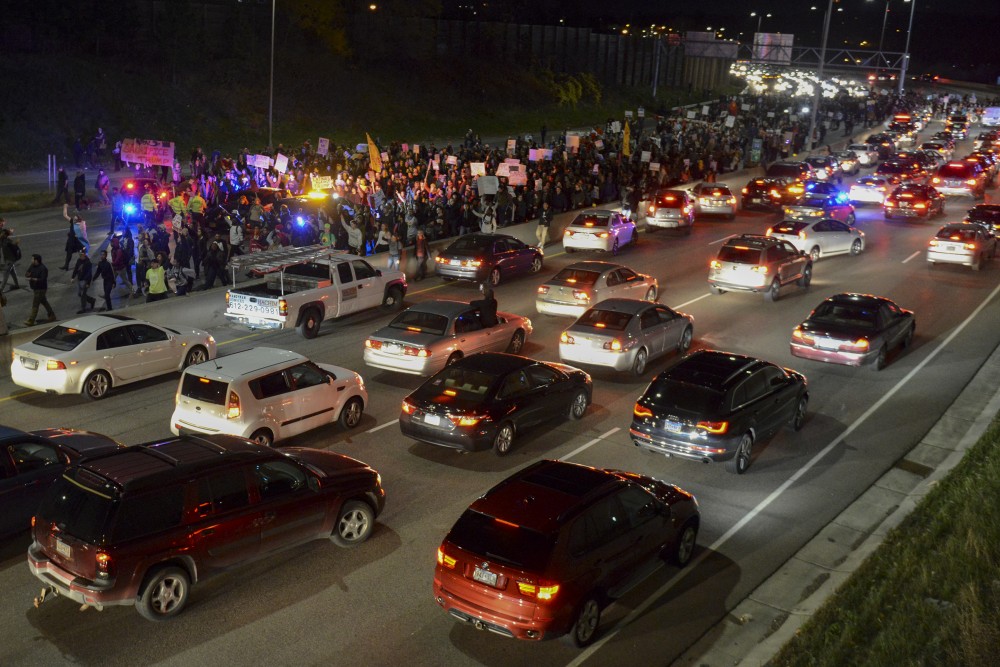Highway protesters in Minnesota could face stiffer penalties if two proposed bills are passed at the state Legislature this year.
Rep. Nick Zerwas, R-Elk River, introduced the bills Jan. 19 and 23 and was met with animosity from Minnesota residents who claim it infringes on free speech. The bills would make participants of “an unlawful assembly” or “public nuisance” accountable for the cost of police responses to the events and charge those who obstruct highways with a gross misdemeanor.
Zerwas said he wrote the bills after hearing about two constituents whose lives were disrupted by protests. One constituent missed an important medical appointment due to the I-35W bridge protest of the police killing of Philando Castile last year, and waited three months for another appointment. Another protest caused a constituent to miss a flight to visit their dying parent.
But some say the bills unfairly target political dissent, highway protests in particular.
“Shutting down a highway is an important way to protest because it forces both the public and the government to realize that they cannot just continue to ignore the issue,” said Abby Norling-Ruggles, a Minneapolis native who pleaded guilty to one misdemeanor after participating in the I-35W bridge protest.
At a Minnesota House of Representatives Civil Law and Data Practices Committee meeting last week, Zerwas addressed concerns, saying the bill “would not limit anyone’s ability to legally protest… to legally petition their government or to demonstrate.”
The bill, he said, would take the financial burden of police response off tax-payers. In the last 18 months, protests have cost $2.5 million in the Twin Cities for enforcement, Zerwas said at the meeting.
At one point, Zerwas praised the Jan 21. Women’s March and Jan. 22 pro-life rally for legally exercising their “First Amendment rights.”
But at the meeting, John Thompson, a St. Paul Public Schools employee and friend of Philando Castile criticized the proposed law.
“We have no voice, so what we do is we vote for people like you to make changes,” Thomson said at the meeting. “We vote for people like you to give us hope. We vote for people like you to stand up against garbage laws like this.”
Zerwas said those who oppose the bills should realize that “neither of those bills make anything illegal that is today legal.” He said protesters at the committee meeting exercised their right to free speech, and neither bill would incriminate their actions.
After the bill passed in a 9-6 committee vote, activists in attendance chanted “If we don’t get no justice, they don’t get no peace.”
Jordan Kushner, Minneapolis civil rights attorney said that “[the bill is] designed to price people out of being able to protest,” and said it infringes “a great deal” on citizens’ First Amendment rights.
Kushner said he agreed with protesters at the meeting. “After seeing Republican legislators not paying attention to them and who don’t care about what they have to say, I can understand.”
In his address, Zerwas said the bill to make protesters pay for police fits existing Minnesota law, specifically the state’s ability to sue arsonists for reparations.
“If you’re in one of our great north woods… and you’re convicted of that intentional fire or arson,” he said, “the state of Minnesota has the ability to sue you civilly for the cost that you’ve incurred upon the stat.”
Kushner disagreed. He said defendants aren’t made to pay for police response to theft or murder, and the bill therefore singles out political dissidents.
Zerwas was hopeful both bills will continue through the legislative process. “I hope that with people will choose legal means to express their first amendment rights.”
This story has been updated from its original version.

















